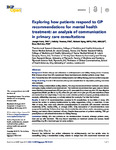Exploring how patients respond to GP recommendations for mental health treatment: an analysis of communication in primary care consultations
| dc.contributor.author | Ford, J | |
| dc.contributor.author | Thomas, F | |
| dc.contributor.author | Byng, Richard | |
| dc.contributor.author | McCabe, R | |
| dc.date.accessioned | 2021-09-21T10:44:41Z | |
| dc.date.issued | 2019-12 | |
| dc.identifier.issn | 2398-3795 | |
| dc.identifier.issn | 2398-3795 | |
| dc.identifier.uri | http://hdl.handle.net/10026.1/17896 | |
| dc.description.abstract |
<jats:sec><jats:title>Background</jats:title><jats:p>Patient take-up and adherence to antidepressants and talking therapy is low. However, little is known about how GPs recommend these treatments and whether patients accept them.</jats:p></jats:sec><jats:sec><jats:title>Aim</jats:title><jats:p>To examine how GPs recommend antidepressants and talking therapy, and how patients respond.</jats:p></jats:sec><jats:sec><jats:title>Design & setting</jats:title><jats:p>A total of 52 recorded primary care consultations for depression, anxiety, and stress were analysed.</jats:p></jats:sec><jats:sec><jats:title>Method</jats:title><jats:p>Using a standardised coding scheme, five ways doctors recommend treatment were coded, conveying varying authority and endorsement. The treatment recommendation types were as follows: more directive pronouncements (I’ll start you on X); proposals (How about we start X?); less directive suggestions (Would you like to try X?); offers (Do you want me to give you X?); and assertions (There are medications that might help). It was also coded whether patients accepted, passively resisted (for example, withholding response), or actively resisted (for example, I’ve tried that before).</jats:p></jats:sec><jats:sec><jats:title>Results</jats:title><jats:p>A total of 33 recommendations occurred in 23 consultations. In two-thirds of cases, GPs treated the patient as primary decision-maker by using suggestions, offers, or assertions. In one-third of cases, they used more directive pronouncements or proposals. GPs endorsed treatment moderately (67%), weakly (18%), or strongly (15%). Only one-quarter of recommendations were accepted immediately. Patients cited fears about medication side effects and/or dependency, group therapy, and doubts about treatment efficacy. Despite three-quarters of patients resisting, 76% got prescriptions or self-referral information for talking therapy.</jats:p></jats:sec><jats:sec><jats:title>Conclusion</jats:title><jats:p>Initially, GPs treat patients as the decision-maker. However, although patients resist, most end up with treatment. This may impact negatively on treatment uptake and success. Social prescribing may fill a treatment gap for some patients.</jats:p></jats:sec> | |
| dc.format.extent | bjgpopen19X101670-bjgpopen19X101670 | |
| dc.format.medium | Print-Electronic | |
| dc.language | en | |
| dc.language.iso | en | |
| dc.publisher | Royal College of General Practitioners | |
| dc.subject | general practice | |
| dc.subject | mental health | |
| dc.subject | patients | |
| dc.subject | primary health care | |
| dc.subject | research methods (other) | |
| dc.subject | social sciences | |
| dc.title | Exploring how patients respond to GP recommendations for mental health treatment: an analysis of communication in primary care consultations | |
| dc.type | journal-article | |
| dc.type | Journal Article | |
| plymouth.author-url | https://www.ncbi.nlm.nih.gov/pubmed/31662317 | |
| plymouth.issue | 4 | |
| plymouth.volume | 3 | |
| plymouth.publication-status | Published | |
| plymouth.journal | BJGP Open | |
| dc.identifier.doi | 10.3399/bjgpopen19x101670 | |
| plymouth.organisational-group | /Plymouth | |
| plymouth.organisational-group | /Plymouth/Faculty of Health | |
| plymouth.organisational-group | /Plymouth/Faculty of Health/Peninsula Medical School | |
| plymouth.organisational-group | /Plymouth/REF 2021 Researchers by UoA | |
| plymouth.organisational-group | /Plymouth/REF 2021 Researchers by UoA/UoA03 Allied Health Professions, Dentistry, Nursing and Pharmacy | |
| plymouth.organisational-group | /Plymouth/Research Groups | |
| plymouth.organisational-group | /Plymouth/Research Groups/FoH - Community and Primary Care | |
| plymouth.organisational-group | /Plymouth/Research Groups/Institute of Health and Community | |
| plymouth.organisational-group | /Plymouth/Research Groups/Institute of Translational and Stratified Medicine (ITSMED) | |
| plymouth.organisational-group | /Plymouth/Research Groups/Institute of Translational and Stratified Medicine (ITSMED)/CCT&PS | |
| plymouth.organisational-group | /Plymouth/Research Groups/Plymouth Institute of Health and Care Research (PIHR) | |
| plymouth.organisational-group | /Plymouth/Users by role | |
| plymouth.organisational-group | /Plymouth/Users by role/Academics | |
| dc.publisher.place | England | |
| dcterms.dateAccepted | 2019-08-12 | |
| dc.rights.embargodate | 2021-9-22 | |
| dc.identifier.eissn | 2398-3795 | |
| dc.rights.embargoperiod | Not known | |
| rioxxterms.versionofrecord | 10.3399/bjgpopen19x101670 | |
| rioxxterms.licenseref.uri | http://www.rioxx.net/licenses/all-rights-reserved | |
| rioxxterms.licenseref.startdate | 2019-12 | |
| rioxxterms.type | Journal Article/Review |


